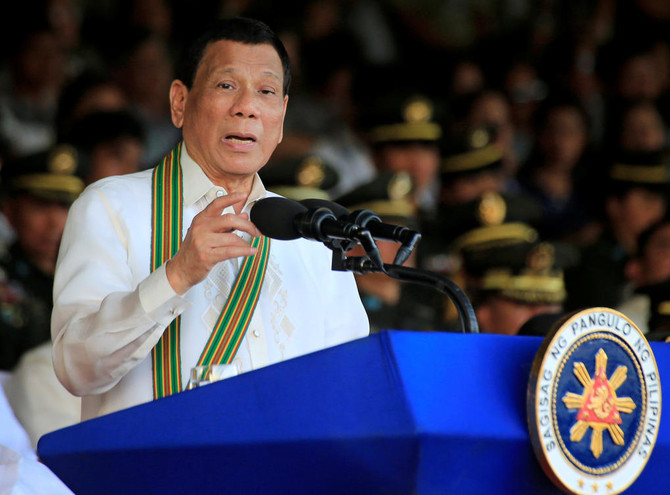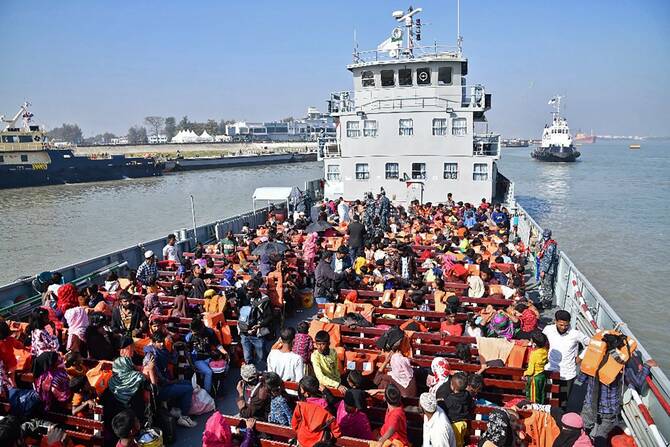MANILA: Philippine President Rodrigo Duterte has asked for provisions such as seven hours’ sleep a day, nutritious food and holidays to be added to the bilateral agreement that is to protect the rights of Filipino workers in Kuwait.
Duterte said that he was late giving his scheduled speech at the Philippine National Police Academy (PNPA) 39th commencement exercises in Silang, Cavite on Wednesday, because of work on the final draft of the agreement.
The president said after studying the document, he had inserted some provisions in the agreement.
“I demanded that it will be a contract — government to government — and that there will be some mandatory provisions like they (Filipino workers in Kuwait) should be allowed to sleep at least seven hours a day,” the president said.
He added that Filipino workers should also be fed “nutritious food.” “I will not, we will not allow leftovers to be eaten by our countrymen. They should be allowed to cook their own food,” he said.
The president also said that passports of overseas Filipino workers (OFWs) should not be confiscated by employers and that OFWs should be allowed holidays.
Duterte reiterated that Filipinos are not slaves. “I have said that we are not slaves. Maybe our only fault would be ... because we are poor,” the president said.
Filipino Labor Secretary Silvestre Bello III told Arab News last week that after a brief impasse in the two-day negotiations between Philippines and Kuwait officials held in Manila, officials from both countries agreed a draft migrant labor protection pact.
In a telephone interview, Bello explained the delay was due to two ticklish issues — OFW passports being withheld by employers and employment contracts. He said the Kuwaiti officials eventually agreed to their proposals on both issues.
The draft agreement stipulates a $400 net-per-month salary for OFWs. Employers must open a bank account in which to deposit the worker’s salary. OFWs must also have mobile phones and be able to use them as well as other means of communication.
It was also agreed that an OFW must give a written consent where an employee is required to transfer from one employer to another, and that written approval for the transfer is obtained from the Philippine labor attache.
Duterte says Filipino workers in Kuwait must have seven hours’ sleep, good food and holidays
Duterte says Filipino workers in Kuwait must have seven hours’ sleep, good food and holidays

Bangladesh halts controversial relocation of Rohingya refugees to remote island

- Administration of ousted PM Sheikh Hasina spent about $350m on the project
- Rohingya refuse to move to island and 10,000 have fled, top refugee official says
DHAKA: When Bangladesh launched a multi-million-dollar project to relocate Rohingya refugees to a remote island, it promised a better life. Five years on, the controversial plan has stalled, as authorities find it is unsustainable and refugees flee back to overcrowded mainland camps.
The Bhasan Char island emerged naturally from river sediments some 20 years ago. It lies in the Bay of Bengal, over 60 km from Bangladesh’s mainland.
Never inhabited, the 40 sq. km area was developed to accommodate 100,000 Rohingya refugees from the cramped camps of the coastal Cox’s Bazar district.
Relocation to the island started in early December 2020, despite protests from the UN and humanitarian organizations, which warned that it was vulnerable to cyclones and flooding, and that its isolation restricted access to emergency services.
Over 1,600 people were then moved to Bhasan Char by the Bangladesh Navy, followed by another 1,800 the same month. During 25 such transfers, more than 38,000 refugees were resettled on the island by October 2024.
The relocation project was spearheaded by the government of former Prime Minister Sheikh Hasina, who was ousted last year. The new administration has since suspended it indefinitely.
“The Bangladesh government will not conduct any further relocation of the Rohingya to Bhasan Char island. The main reason is that the country’s present government considers the project not viable,” Mizanur Rahman, refugee relief and repatriation commissioner in Cox’s Bazar, told Arab News on Sunday.
The government’s decision was prompted by data from UN agencies, which showed that operations on Bhasan Char involved 30 percent higher costs compared with the mainland camps in Cox’s Bazar, Rahman said.
“On the other hand, the Rohingya are not voluntarily coming forward for relocation to the island. Many of those previously relocated have fled ... Around 29,000 are currently living on the island, while about 10,000 have returned to Cox’s Bazar on their own.”
A mostly Muslim ethnic minority, the Rohingya have lived for centuries in Myanmar’s western Rakhine state but were stripped of their citizenship in the 1980s and have faced systemic persecution ever since.
In 2017 alone, some 750,000 of them crossed to neighboring Bangladesh, fleeing a deadly crackdown by Myanmar’s military. Today, about 1.3 million of them shelter in 33 camps in the coastal Cox’s Bazar district, making it the world’s largest refugee settlement.
Bhasan Char, where the Bangladeshi government spent an estimated $350 million to construct concrete residential buildings, cyclone shelters, roads, freshwater systems, and other infrastructure, offered better living conditions than the squalid camps.
But there was no regular transport service to the island, its inhabitants were not allowed to travel freely, and livelihood opportunities were few and dependent on aid coming from the mainland.
Rahman said: “Considering all aspects, we can say that Rohingya relocation to Bhasan Char is currently halted. Following the fall of Sheikh Hasina’s regime, only one batch of Rohingya was relocated to the island.
“The relocation was conducted with government funding, but the government is no longer allowing any funds for this purpose.”
“The Bangladeshi government has spent around $350 million on it from its own funds ... It seems the project has not turned out to be successful.”














